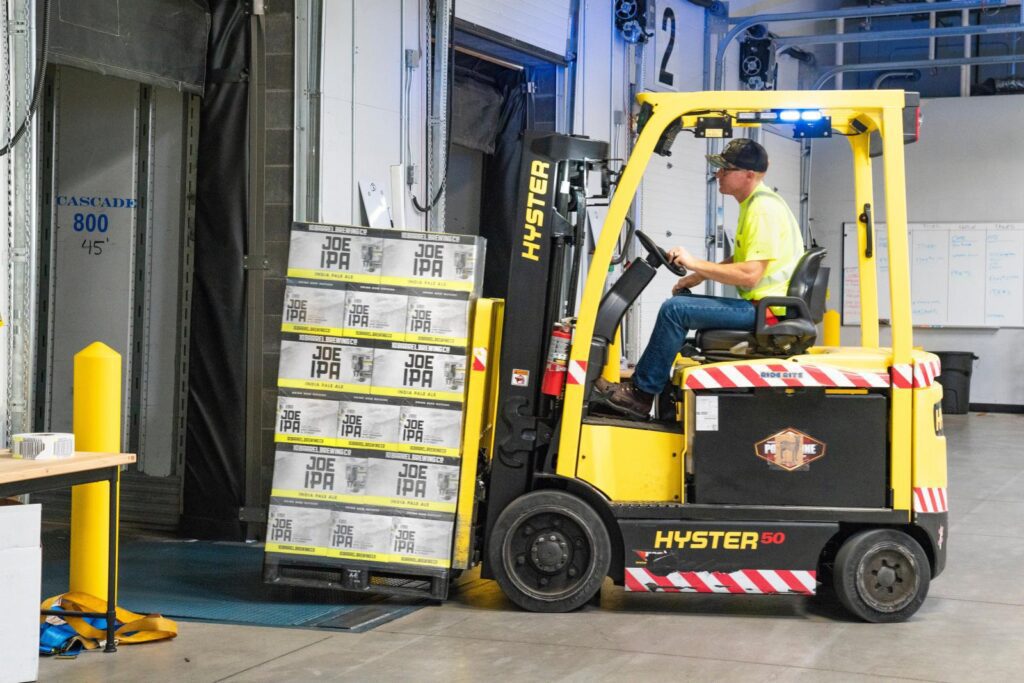News & Stories
Employment
Article
Resource
Finding A Job With Support
25 July 2023
Top industries to get a job right now

Embracing Inclusivity: Top Job Opportunities for People with Disabilities
Finding a job that suits you can be hard if you have a disability, injury, or illness. Fortunately, more industries and workplaces are starting to embrace diversity and create accessible and supportive work environments.
According to Jobs Queensland, the number of jobs available in Queensland is expected to rise across all major industries. By 2025, it is anticipated that:
- an additional 281,000+ workers will be needed to fill these new roles, including in industries that were previously affected by COVID-19.
- job growth will range from 18.5% in accommodation and food services to 1% in manufacturing.
We’ve put together a list to help you find a job that is right for you in industries that prioritise inclusivity and offer a fulfilling career. The following sectors have been carefully chosen based on their demand, potential for growth, and commitment to diversity and inclusion.

Hospitality and Tourism Industry
The hospitality and tourism industry continues to be to provide many new work opportunities for people with diverse skill sets.
What you need to land a job in hospitality
For entry-level roles in hospitality, you may need a high school certificate or equivalent. If you’re interested in more specialised roles like chef, cook, or food and beverage manager, you’ll need specific qualifications or work experience.
In this industry, soft skills are often just as important as work experience and can be the deciding factor in helping you get a job. The following soft skills are highly valued in hospitality jobs:
- good customer service
- friendly personality
- good communication
- being organised
- problem-solving.
Understanding accessibility regulations and inclusive practices in the hospitality industry could also improve your chances of getting a job.
Inclusive guest service roles
The hospitality industry has made a real effort to be more inclusive of employees with disabilities by diversifying and adapting traditional roles. Hiring people with disability in customer service or front-of-house roles is becoming increasingly common in hospitality venues due to the positive, meaningful, and memorable connections these employees make with their customers.
Hospitality venues are actively hiring people with disabilities, acknowledging their unique perspectives and abilities to enhance the guest experience.
Types of Hospitality Jobs
- Front Desk Clerk: Welcomes guests, checks them in, and assists with enquiries and reservations.
- Chef/Cook: Prepares and cooks meals in restaurants or hotels.
- Food & Beverage Attendant or Manager: Oversees restaurant operations, manages staff, and ensures excellent customer service.
- Housekeeping Attendant: Ensures rooms are clean, organised, and equipped with necessary amenities.
- Guest Services Coordinator: Assists guests with special requests and provides personalised services.

Cleaning and Maintenance Sector
Jobs in the cleaning and maintenance sector have become very popular, especially in the wake of the pandemic. As businesses and public spaces prioritise hygiene and safety, the demand for skilled cleaning and maintenance personnel has skyrocketed.
What you need to land a job in cleaning and maintenance
Entry-level positions, such as janitors and cleaners may require a high school certificate or equivalent.
If you would like to become a cleaner you should also consider undertaking training and certification that focusses on:
- specialised cleaning techniques
- handling cleaning equipment
- carpet cleaning or infection control
- adhering to safety protocols.
Supportive work environments
Businesses are implementing measures to create supportive work environments for employees with disabilities. Many employers are providing:
- adaptive tools and equipment
- flexible work schedules to accommodate the specific needs of people with disability
- inclusive communication practices like Easy Read documents and icon-based checklists
- accessible work practices.
Types of Cleaning and Maintenance Jobs
- Commercial Cleaner: Cleans and maintains the cleanliness of buildings and facilities.
- Custodial Staff: Performs cleaning and maintenance tasks in commercial or public spaces.
- Carpet Cleaner: Specialises in cleaning and maintaining carpets in homes and businesses.
- Sanitation Worker: Ensures proper waste management and sanitation in public areas like rest stops and parks.

Community Services
If you have a deep passion for helping others and making a positive impact, a job in community services could be for you.
What you need to land a job in community services
Entry-level roles may have varying education requirements. Some positions may accept a high school certificate or equivalent, whereas others may require you to have specific qualifications or certifications.
If you’re interested in working in community services, you should consider:
- gaining experience through volunteering or internships in community service organisations
- undertaking training programs in areas like counselling, community development, or program management.
Fostering inclusivity in community services
The community service sector has long been a champion of inclusivity, striving to ensure that all members of the community, regardless of their abilities, have access to vital services and employment opportunities.
Non-profit organisations and government initiatives are taking proactive steps to hire people with disabilities, recognising the value of diverse perspectives in addressing community needs.
Supportive work policies, such as remote work options and accessible fit-outs, are being adopted to promote the well-being of employees with disabilities. These are often referred to as ‘reasonable adjustments’.
Types of Community Service Jobs
- Social Worker: Provides counselling, support, and resources to individuals and families in need.
- Community Outreach Coordinator: Organises and coordinates outreach programs and events.
- Program Manager: Manages and oversees the implementation of community-based programs.
- Fundraising Coordinator: Plans and executes fundraising campaigns for non-profit organisations.
- Case Worker: Assists individuals in accessing services and support within the community.

Labour and Trades
The labour sector is widespread and encompasses many different industries, including:
- construction
- manufacturing
- logistics.
What you need to work as a labourer
Entry-level positions may require a high school diploma, vocational training, or on-the-job training, depending on the specific job requirements.
For other roles, such as construction labourers, you will need a certain level of physical strength, while manufacturing roles could require technical skills and knowledge of machinery.
You should consider:
- undertaking vocational training programs tailored to specific labour sectors
- acquiring relevant certifications, like fork lift operator licences and other specialised machinery licences
- workplace health and safety procedures.
Building an inclusive workforce
Employers in the labour market are actively recruiting people with disabilities and implementing diversity and inclusion programs to ensure equal opportunities.
Workplaces are being upgraded to be more accessible, including modifications to workstations and the use of assistive technology.
Training initiatives centered around disability awareness and accessibility are helping create a more inclusive and accepting work culture.
Types of Labouring Jobs
- Construction Labourer: Assists with various tasks on construction sites, such as carrying materials and site preparation.
- Manufacturing Technician: Operates machinery and assembles products in manufacturing plants.
- Warehouse Worker: Manages inventory, packs, and ships products in warehouse settings.
- Forklift Operator: Operates forklifts and other heavy equipment in logistics and warehouse environments.
- Truck Driver: Transports goods and materials from one location to another.

Creative Industries
If you’re searching for a career that channels your creative side there are many job options available including graphic design, multimedia, content creation, and more. Creative roles not only offer diverse opportunities for people with disabilities, illness, or injury, but they also give many the option to work for themselves.
What you need to work in creative industries
Some positions in the creative field will require a portfolio showcasing your work, along with relevant qualifications or certifications. For example, to be a graphic designer, you might need a degree or diploma in graphic design or a related field.
To secure a creative role, you should consider:
- undertaking courses or workshops that develop your artistic abilities and technical skills
- collaborating with mentors
- participating in online creative communities can also help you build your portfolio and gain valuable experience.
Celebrating diversity of expression
The creative industries are actively hiring people with disabilities who bring unique perspectives and creativity to their projects. Creative agencies are also fostering a culture of open communication and understanding to create an environment where all employees feel valued and empowered to contribute their best work.
Types of Creative Industries Jobs
- Graphic Designer: Creates visual designs for websites, advertisements, and marketing materials.
- Content Creator: Produces engaging content for blogs, social media, and video platforms.
- Multimedia Artist: Combines various artistic elements to create multimedia projects.
- Video Editor: Edits and assembles video footage to produce high-quality videos.
- Web Developer: Designs and develops websites with a focus on user experience and functionality.

Early Childhood Education and Childcare
The early childhood education and childcare sector attracts passionate people who enjoy working with children.
What you need to work in early childhood education and childcare
If you’re interested in working in early childhood education or childcare, you might only require a high school certificate for entry-level positions. Formal qualifications, such as a bachelor’s degree in early childhood education, may be needed for teaching and management roles.
To increase your chances of securing a job in this rewarding sector, you should consider:
- gaining experience through volunteering
- assisting in childcare programs
- obtaining relevant certifications in first aid, CPR, and early childhood education.
Nurturing inclusive learning spaces
Childcare centres and educational institutions are committed to providing inclusive work environments for people with disabilities. Specialised learning techniques, modified training courses, and flexible work arrangements mean that more people with disability are afforded the same opportunities as their peers.
Types of Early Childhood Education and Childcare Jobs
- Preschool Teacher: Educates and nurtures young children in a structured learning environment.
- Childcare Assistant: Assists teachers in caring for and supervising children in childcare centres.
- Early Intervention Specialist: Provides support and intervention services to children with developmental delays.
- Child Life Specialist: Supports children and families in medical settings through play and therapeutic activities.
The current job market is more diverse and inclusive than ever before, offering many opportunities for job seekers from all walks of life, including those with disabilities. If you’d like to find out what type of job might be best for you, contact HELP today.
Give us a call and one of our friendly team members will be in touch shortly
We’re here to help!
Our Locations
With over 40 locations across Southeast Queensland, we’re nearby for when you need us.
Find your nearest location